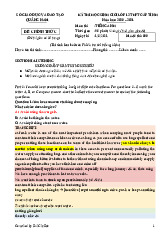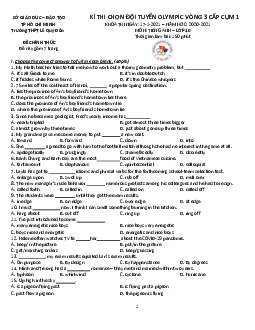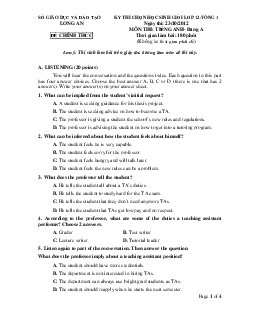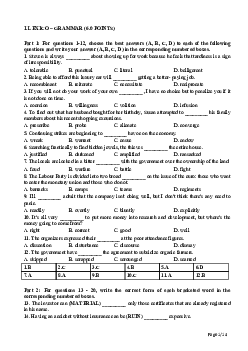







Preview text:
SỞ GD & ĐT THANH HÓA
KHẢO SÁT CHẤT LƯỢNG HĐ THI LIÊN TRƯỜNG
ĐỘI TUYỂN HỌC SINH GIỎI KHỐI 12 Huyện Hậu Lộc NĂM HỌC: 2021-2022
ĐỀ THI MÔN: TIẾNG ANH Thời gian làm bài: 150 phút
(Trắc nghiệm 90 phút + Tự luận 60 phút), không kể thời gian giao đề. Đề thi có 08 trang.
Số báo danh:……………………………………………….… Phòng thi: ……………..
PHẦN TRẮC NGHIỆM (70 pts)
SECTION A: LISTENING (10 pts)
Part 1: Questions 1 – 5: You will hear two students talking about their presentations at university.
For each of the following questions, choose the option which fits best to what you hear. You will
listen to the recording twice.
1. Sarah felt nervous because____.
A. too many people were watching her.
B. she doesn’t like Professor Stone.
C. she realized the professor would be taking notes.
2. Sarah thought that Charlie’s main weakness was _____.
A. his Power Point presentation. B. the accompanying music. C. the speech itself.
3. Charlie feels that he can improve if he _______.
A. spends more time on his visuals. B. provides more examples.
C. reduces the length of his speech by two minutes.
4. Sarah is worried about her written work because ______. A. her essays are too long.
B. she feels her grades are low.
C. she hasn’t done enough essays.
5. What does Charlie think about Sarah’s presentation? A. He thinks it is useful.
B. He thinks it doesn’t have a focus.
C. He thinks some parts are redundant.
Part 2: Questions 6-10: You will hear a girl talking about her life since she left Vietnam. For each
of the following questions, choose the option which fits best to what you hear.
6. Why did the speaker have to help her mother with the shopping ?
A. There were no Vietnamese people living near her.
B. There were no Vietnamese working in the stores.
C.There wasn’t always someone to go shopping with her.
D. Her mother could speak a little English.
7. Why did her father find working in a factory difficult ?
A. He couldn’t speak any English. B. He didn’t have many friends there.
C. He had had a much better job in Vietnam.
D. He couldn’t get used to the working style. 1
8. Why are the speaker and her brother more fortunate than their sisters ?
A. They did not need extra English lesson. B. They look more American
C. They speak with American accents.
D. They quickly adopted the way of life.
9. What has the speaker forgotten about life in Vietnam ?
A. living close to other people B. The warm weather
C. Wearing traditional clothes D. Traditional food
10. Why does she find it difficult to invite her friends to her home ?
A. Her parents do not have much money.
B. Her parents haven’t adopted an American way of life.
C. Her parents only know how to cook Vietnamese food.
D. Her parents do not speak English well. SECTION B. PHONETICS
Mark the word whose underlined part differs from the other three in pronunciation 11. A. kerosene B. tinsel C. pessimism D. mussel 12 A. caused B. increased C. practised D. promised . 13. A. scowl B. frown C. sprout D. dough
Mark the word that differs from the other three in the position of primary stress.
14. A. demonstrative B. extravagant C. chandelier D. legitimate 15. A. determine
B. distinguish C. develop D. rearrange
SECTION C: VOCABULARY AND GRAMMAR
Choose the most suitable word or phrase to complete each sentence.
16. You can’t believe a word that woman says – she is a _____ liar. A. dedicated B. devoted C. committed D. compulsive
17.The curriculum at the public school is as good___________of my private school.
A. or better than B. as or better than that
C. expensive than D. lesser expensive than
18. When you come down the hill, do drive slowly because it is not ___ obvious where the turning is. A. immediately B. directly C. instantaneously D. quite
19. At her trial in 1431, Joan of Arc was accused of being in _____ with the devil. A. cooperation B. association C. league D. conjunction
20. The flights are full at the moment, so you’ll have to _____. A. run a stroke of luck B. get a better luck C. be down on your luck D. take pot luck
21. I heard ______ that Jack has been dropped from the basketball team. A. in the woods B. on the grapevine C. under your feet D. on the olive branch
22. Many habitats change ________ the types of plants and animals that live there.
A. with respect to B. in respect for C. as for D. as against
23. Unfortunately some really ill animals have to be _______ by our center. A. put down B. turned over C. passed away D. taken out
24. My brother often plays_____________ guitar in a music band at ________school. A. the/the B. the/ Ø C. Ø/the D. a/the
25. Catherine , ________ , works for Sony Corporation in Japan. A. being my oldest sister B. who my oldest sister is 2
C. my oldest sister D. who being my oldest sister
26.General Custer was confident of victory despite being vastly________by the enemy. A. outnumbered B. outclassed C. overcome D. overtaken
27. The weather forecast predicted __________weather with snow, sunshine, wind, and thunder, and that is what we have had A. various B. differing C. variable D. fluctuating
28. The ministry refused to __________the figures to the press. A. release B. leak C. show D. add
29. Steve________his chances of passing by spending too much time on the first question. A. threw out B. threw off C. threw away D. threw in
30:______ warfare duties primarily to males was imperative when combat was hand-to-hand. A. Assigned B. Assigning
C. They who assigned D.That they were assigning
31. Since he spoke about the subject so indirectly, it was difficult to see what he was______. A. getting at B. getting on C. getting in D. getting up
32. James had,__________, saved the manuscript of his first novel from the burning house A. lastly B. At last C. lately D.at least
33. According to estimates, there ________ no energy shortage after these large dams____________.
A. will be - have been constructed B. is -- will be constructed the age
C. should be - have been constructed D. was – would be constructed low
34. They go to the seaside __________ they should be disturbed by the noises of the city.
A. in order that B. so that C. for D. lest
35.___________so incredible is that these insects successfully migrate to places they have never seen .
A. That makes the monarch butterflies' migration
B. The migration of the monarch butterflies is
C. What makes the monarch butterflies' migration
D. The migration of the monarch butterflies, which is
36. “I thought you'd get here much earlier.” “I know. We___________it without our flight
______________ almost two hour late."
A. could make - taking off B. would have made - took it off
C. must have made - taking off D. could have made – taking off
Mark the word(s) CLOSEST in meaning to the underlined word(s) in each of the following questions.
37: In the world of models, every model girl tries every trick in the book to stop others from succeeding.
A. every available method B. all kinds of tricks
C. all styles of writing D. every story slot
38: Winning that prize has gone to his head.
A. made him very conceited. B. made him angry C. gone to the sky D. caused him rich
Mark the word(s) OPPOSITE in meaning to the underlined word(s) in each of the following questions.
39: "I made a mess of the exam. But I think I should pass, as I only need 50%......"
A. to make a big mistake
B. to do at one’s best C. to loose confidence D. to change your plan 3
40: Most universities have trained counselors who can reassure and console students who have academic or personal problems. A. discourage B. sympathize C. satisfy D. please
Mark the letter A, B, C, or D on your answer sheet to indicate the most suitable response to
complete each of the following exchanges.
41. Jane is talking to Mike, her husband. Jane: “ _______ ”
Mike: “Don’t worry. I will hold another job.”
A. It’s freezing cold outside.
B. Our son is mischievous.
C. This month’s electricity bill is too high.
D. I was unfairly treated at work.
42. Two students are talking about space exploration.
Ted: “I believe that one day people will be able to live on another planet.”
Kate: “ _______. Scientists have found some places outside the Earth which are habitable.” A. Positively.
B. I can agree with you anymore. C. I doubt it. D. With uncertainty.
Choose the underlined part that needs correction in each of the following questions. 43: T
he council wants to develop more h ousing outside town, but that is scared land, according to
an aborigine at the town meeting. A. The council B. housing C. scared D. aborigine
44: In Italy public opinion as a whole was favorite to the visit, especially as it was not considered
an obstacle to the projected increase of the army and navy. A. as a whole B. favorite C. especially as D. projected increase
45: Fiorello La Guadian made a speech to the United Nations Relief Administration, which he was the
director, stating that Europe experienced prosperity after the World War II. A. he B. stating C. which D. made
SECTION D: READING COMPREHENSION
Read the following passage and then choose the most suitable word or phrase for each space.
It is now extremely popular to take a gap year between school and university or university and work
and to spend it traveling. There are plenty of reasons to recommend it - travel broadens the mind,
you’re (46) ___ young once, life isn’t a rehearsal and so on. And if you don’t do it, you may always
regret that you didn’t take the (47) __. In the end, there’s only one response: well, why not?
The idea may have its roots in the 18th century Grand tour once (48) ___ by the young, rich and
noble, but it is the middle classes who have turned it (49) ___ something that 200,000 British
youngsters do every year. (50) ___ has never been so easy and cheap, with more places open to tourists
than ever. Also, the gap year is now (51) ___ by many employers and universities.
The States, the Far East and Australia were among the original (52) ___ and although these
remain in the top five, young explorers are now going even further. The most far-flung corners of the
world are (53) ___ in popularity year by year. About $700 will buy a student ticket (54) ___ for six
months that will take you from London to Calcutta, Singapore, Bangkok, Perth, Sydney, Auckland,
Fiji, Tahiti, Los Angeles and (55) ___ again. 46. A. merely B. only C. slightly D. simply 47. A. occasion B. moment C. chance D. luck 48. A. undertaken B. gone C. done D. given 49. A. up B. out C. over D. into 4 50. A. Voyage B. Travel C. Excursion D. Tour 51. A. received B. stood C. accepted D. admitted 52. A. destinations B. endings C. landings D. terminals 53. A. spreading B. expanding C. enlarging D. growing 54. A. genuine B. valid C. effective D. legal 55. A. now B. here C. back D. then
Read the following passage and mark the letter A, B, C or D on you answer sheet to indicate the
correct answer to each of the questions.
It is hard to get any agreement on the precise meaning of the term "social class". In everyday
life, people tend to have a different approach to those they consider their equals from which they
assume with people they consider higher or lower than themselves in social scale. The criteria we use
to "place" a new acquaintance, however, are a complex mixture of factors. Dress, way of speaking,
area of residence in a given city or province, education and manners all play a part.
In ancient civilizations, the Sumerian, for example, which flourished in the lower Euphrates valley
from 2000 to 5000 B.C. social differences were based on birth, status or rank, rather than on wealth.
Four main classes were recognized. These were the rulers, the priestly administrators, the freemen
(such as craftsmen, merchants or farmers) and the slaves.
In Greece, after the sixth-century B.C., there was a growing conflict between the peasants and the
aristocrats, and a gradual decrease in the power of the aristocracy when a kind of ‘middle class’ of
traders and skilled workers grew up. The population of Athens, for example, was divided into three
main classes which were politically and legally distinct. About one-third of the total population were
slaves, who did not count politically at all, a fact often forgotten by those who praise Athens as the
nursery of democracy. The next main group consisted of resident foreigners, the "metics" who were
free men, though they too were allowed no share in political life. The third group was the powerful
body of "citizens", who were themselves divided into sub-classes.
The medieval feudal system, which flourished in Europe from the ninth to the thirteenth century,
gave rise to a comparatively simple system based on birth. Under the King, there were two main
classes - lords and "vassals", the latter with many subdivisions.
In the later Middle Ages, however, the development of a money economy and the growth of cities
and trade led to the rise of another class, the "burghers" or city merchants and mayors. These were the
predecessors of the modem middle classes. Gradually high office and occupation assumed importance
in determining social position, as it became more and more possible for a person bom to one station in
life to move to another. This change affected the towns more than the country areas, where remnants
of feudalism lasted much longer.
56: The word "remnants" in the last paragraph is most likely to correspond to...... A. clothing B. garments
C. remains D. opponents
57: The decline of the Greek aristocracy’s power in the sixth century B.C.....
A. was assisted by a rise in the number of slaves
B. coincided with the rise of a new "middle class" of traders and peasants
C. caused international conflicts in the area D. lasted for only a short time
58: The four main classes of Sumerian civilization.........
A. did not include slaves
B. took little account of status or rank
C. were not clearly defined D. took little account of financial standing
59: Athens is often praised as the nursery of democracy.........
A. because even very young children could vote
B. even though slaves were allowed to vote 5
C. in spite of its heavy dependence on slave labour
D. because its three main classes were politically and legally distinct.
60: According to the passage, we evaluate other people's social position by......
A. the kind of job they do
B. their dress, manners, area of residence and other factors
C. finding out how much their salary is D. questioning them in great details
61: The word "predecessors" in the last paragraph is closest in meaning to...... A. authorities B. descendants C. supporters D. ancestors
62: The passage is mainly about........
A. the social life in ancient Greece B. the modem society
C. the division of social classes in the ancient world D. the human history
Read the passage and mark the letter A, B, C or D on you answer sheet to indicate the best answers
to each question bellow.
THE IRISH LANGUAGE TODAY
Until about the seventeenth century, Irish was the normal everyday language of Ireland. At that time,
though, the English who had colonised the country began to impose their own language and the Irish
people gradually accepted this, mostly for economic reasons. All official business was conducted in
English and the British economy dominated the country. This practical motivation to use English
grew even stronger when people began to leave Ireland in vast numbers in the nineteenth century.
Families thought that it would be difficult to move to an English - speaking country such as America,
Australia or England if they knew nothing but Irish.
Nowadays it is estimated that little more than one per cent of the population of the country use Irish
as their daily first language. Even in the areas of the country which are supposed to be Irish speaking,
the use of the language is decreasing. These areas, known officially as the 'Gaeltacht', are mainly in the
remote far west of the country and have a total population of 83,000, of whom nearly all can speak
Irish, although only about 30,000 use it as their normal language of communication. All children in
Ireland have to learn Irish. Until 1973 pupils had to gain a pass in Irish if they were to be awarded
their school leaving certificate. This rule was very unpopular and was dropped. Pupils still have to
take Irish for these examinations but it no longer seems to matter very much if they fail.
Most children in primary schools seem to enjoy their Irish lessons but in secondary schools the
situation is often different. As examination pressure mounts, pupils often find Irish to be boring and
irrelevant, as compared with French or German, which can at least be useful for getting a job. The
most surprising development of recent years has been the rapid rise in the number of state schools in
towns that do all their main teaching in Irish. This is not a scheme imposed by the state but one that
has grown up in response to the demands of parents. Some parents send their children to these schools
for patriotic reasons, believing them to be a defense against the country being swamped with
American and English culture. Many other parents choose these schools simply because they see them
as being better than the English-language schools. They tend to be newer and to have smaller classes
and better motivated teachers. One criticism made of these schools is that they could be distracting
pupils from learning 'more useful' modern languages. In fact, in modern languages, as in most
subjects, these schools have results which are better than the national average.
Only time will tell whether the new rise in Irish in the towns will compensate for its decline in the
Irish-speaking areas of the rural west.
( Source: How to pass FCE by Brian Orpet)
63. What do we learn in this passage about Ireland at the beginning of the seventeenth century? 6
A. Many people left for America, Australia and England.
B. English had always been the language used in business.
C. The British began to invade the country.
D. People spoke Irish as their everyday language.
64. People who left Ireland thought_______.
A. they needed nothing more than Irish. B. they would find life easy in an English-speaking country.
C. they ought to know some English. D. they should pretend not to be Irish.
65. In the 'Gaeltacht'_______.
A. 83,000 people use Irish as their normal language of communication.
B. almost everybody uses Irish as their first language.
C. 30,000 people do not understand Irish.
D. there is a fall in the number of people using Irish as their first language.
66. Since 1973, pupils in Irish schools_______.
A. have not needed to pass Irish in order to gain their school leaving certificate. B. have had to drop Irish.
C. have needed to pass Irish in order to gain their school leaving certificate.
D. have not had to study Irish.
67. Why are French and German often more popular than Irish in secondary schools?
A. They ensure that pupils can find a job. B. They are not boring.
C. They can help pupils find work. D. They ease examination pressure.
68. The government introduced schools where teaching was done in Irish because_______.
A. they have better results. B. parents wanted them.
C. pupils in towns do not learn Irish. D. the teachers are more committed
69. Some people have criticized these Irish language schools because_______.
A. they prevent pupils from learning modern languages.
B. they have classes which are too small.
C. their results are only a little better than average.
D. they do not teach any useful subjects.
70. Which of the following would make a suitable title for this passage?
A. Irish - End in Sight. B. Irish - Signs of Hope in the Towns.
C. Irish - A Dead Language. D. Irish - Increasingly Important in the Villages.
PHẦN TỰ LUẬN ( 30 pts)
SECTION E: WRITING ( 30 pts)
I . Rewrite these sentences so that the new one has a similar meaning as the sentence preceded.
71. There’s no way that you’re staying out all night with your friends, I’m afraid.
-> Your staying...................................................................................................
72. My business partner and I are in complete agreement.
-> There is no......................................................................................................
73. I didn’t have enough time to visit the town properly.
→ The time……………………………………………………………. 7
74. Everyone’s saying the government is about to resign.
-> It is ………………………………………………………………………………………
75. The important thing for you to do is work harder.
-> What ............................................................................................................
II. Use the word(s) given in brackets and make any necessary additions to complete a new sentence
in such a way that it is as similar as possible in meaning to the original sentence. Do NOT change
the form of the given word(s).
76. It is stupid of you to refuse Richard’s offer of a loan. (IDIOT)
……………………………………………...…………………………
77. She tried to explain how to operate the photocopier to me and ended up being perplexed. (KNOTS)
She………………………………………………..……………………
78. Never mind your previous failures-try to forget them and think of what your next venture might be! ( BEHIND)
....................................................................................................................................................
79. That he decided to retire early marked the end of his distinguished career. (CURTAIN)
His………………………………………………………………………………
80. You have the right to complain about it in writing. (LODGE)
You are at………………………………………………………………………
III: Write an essay (at least 250 words ) on the following topic: ( 20ps)
Some people believe that that children who are taught to co-operate rather than compete
become more useful adults. To what extent do you agree or disagree with it?
Give reasons for your answer and include any examples from your own knowledge or experience. … The end … 8




